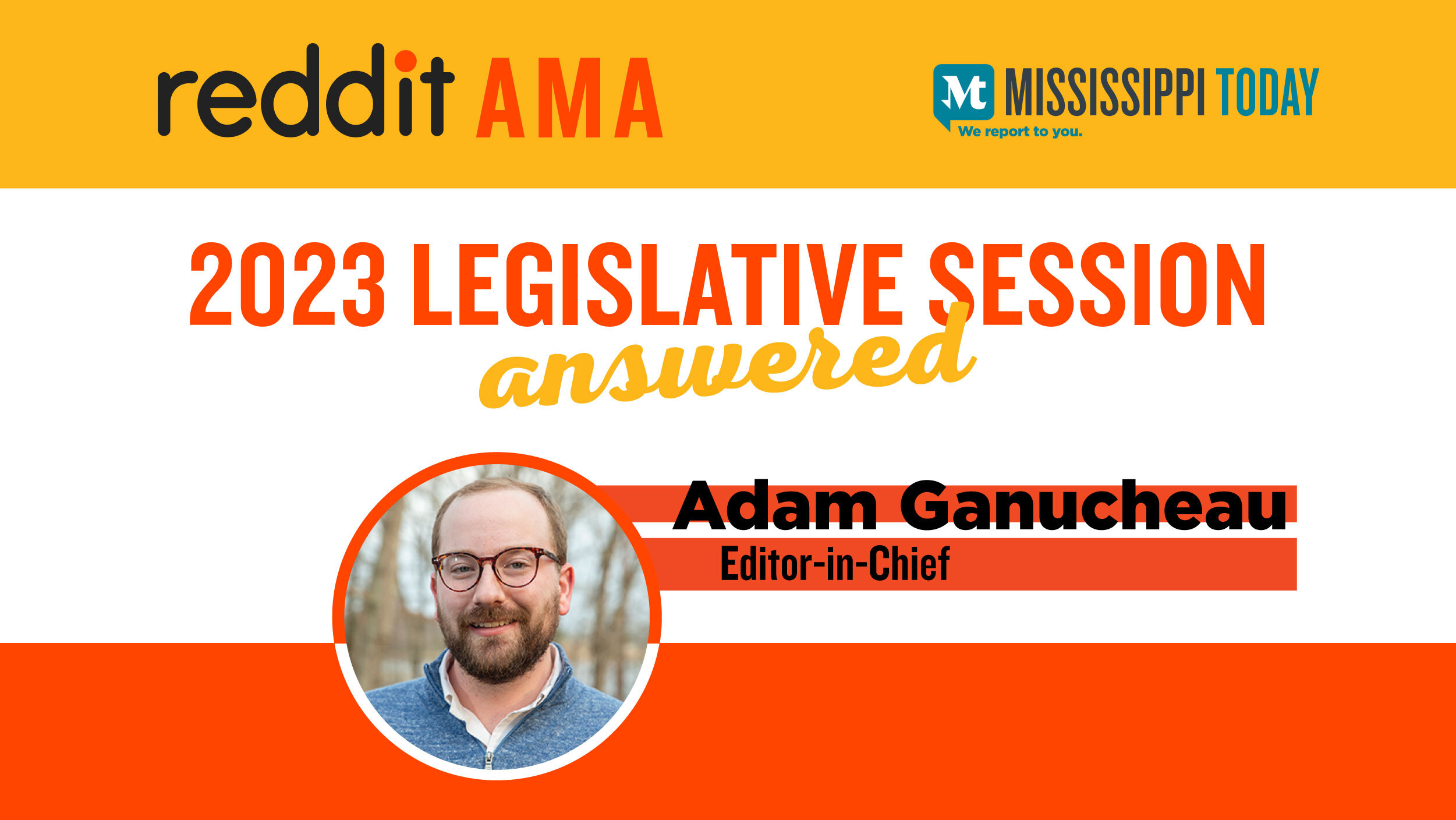Mississippi Today
Reddit AMA recap: 2023 Legislative session with Adam Ganucheau

Reddit AMA recap: 2023 Legislative session with Adam Ganucheau
Mississippi Today's Editor-in-Chief Adam Ganucheau answered your questions on Reddit about the legislative session, the welfare scandal and more.
Read his answers below and catch up on our legislative coverage by reading The Legislative Guide.
Q: Hey Adam, what is the argument for not expanding Medicaid?
A: A very good question, particularly as the state's hospital crisis rages on and hundreds of thousands of poor, working Mississippians cannot afford health care.
The main argument from the handful of Republican leaders who have rejected Medicaid expansion is that we can't afford it. This argument is getting tougher to justify as more and more studies show that it would effectively pay for itself in the form of new jobs and capital created. Plus, there are extra, post-COVID incentives from the federal government for the 11 holdout states to expand.
My colleague Geoff Pender has a great article that runs through all the main arguments for not expanding Medicaid we've heard over the years.
Q: In your mind, do Mississippi politicians feel they are immune to media scrutiny? What can be done to get the public more interested in what their politicians are doing?
A: As journalists, we can only report the truth of what our elected officials do and say and how they serve the public. I do think there are times that media coverage gets a ton of pickup, both across the state and nationally. Too often, as we all know, nothing changes in Mississippi until there's a big, bright national spotlight on us. I hate that has to be the case, but it's been that way for many decades.
I can promise you the politicians feel the weight of that national scrutiny. Rep. Trey Lamar knows a lot about that right now after he proposed HB 1020, dubbed “the Jackson takeover bill,” that has been written about nationally the past couple weeks. He has millions of people around the nation calling him a racist, and it's evident from his Twitter page that he is hearing and seeing that. Whether or not it changes his thinking or perspective, more to your point, is less certain.
I don't know, exactly, how to get the public more interested in what the politicians are doing. I do know that we at Mississippi Today will keep being as blunt and truthful about what we see as we can. I also think so many elected officials in Mississippi rarely hear directly from constituents about anything, really. It would seem to me that could change some behavior, but it's hard to say.
For a more local example of how the media coverage doesn't sway their behavior:
Read my column from Monday about a tactic House Republicans were ramping up to stifle debate with Democratic colleagues.
Then read our story from Tuesday about House Republicans not only doing what I'd just written but taking it an extreme step further (and peep the incredible photo).
Q: What is the potential for discovery in Brett Favre's lawsuit against Shad White and NFL media personalities to do damage to Phil Bryant and others trying very hard to ignore it all?
A: Honestly no idea. Many people a whole lot smarter than me believe that Favre's defamation suit against Shad White will never reach the discovery phase, but who knows. We do know that Favre has been methodically ramping up the narrative that “Phil Bryant is guilty, not me,” to paraphrase. I'd say in any case that is open and even tangentially related to the welfare scandal, more could potentially come out on Bryant and others who have been scrutinized either in the courts or the public sphere. But it's hard to say what Favre's thinking is on this defamation stuff. No matter what: Anything related to the defamation suit “re-ups” attention on Bryant and others in the scandal. Just look for Bryant's name in any of the hundreds of national stories from the past couple weeks about Favre's suit. It's everywhere.
Some recent Favre finger-pointing, written by my colleague Anna Wolfe.
Q: When can we expect the politicians involved in the TANF scandal to be held accountable?
A: I don't know that anyone can safely say that any additional indictments will be handed down. I can pretty safely say that anything new that comes down will have to come from the feds, not the state. As far as we know, the only state investigation happening is related to the DHS civil suit attempting to recoup much of the known misspent money. Nothing criminal there.
As for what's happening on the federal side, we have been told by several people (and reported as much) that a federal investigation continues. A huge story that I don't think has gotten nearly enough traction is that Biden nominated a U.S. attorney for the southern district of Mississippi who is perhaps the single best qualified person to run a political corruption investigation like this. Todd Gee, a Mississippi native, did exactly that for the U.S. Department of Justice for several years! But Biden's nominations for Mississippi have stalled because of this controversial process in the U.S. Senate called the “blue slip process.” So basically because of Washington politics, this super qualified U.S. attorney can't yet lead the investigation of the welfare scandal. That should be maddening, I believe, to every U.S. taxpayer whose money was literally stolen in this scandal.
All this is to say: I don't know when politicians involved in the TANF scandal will be held accountable. It's possible the answer is “never.”
9/2/22: Biden appoints Todd Gee to lead welfare investigation
1/20/23: Attorneys drop hints that feds are eyeing former Gov. Phil Bryant in welfare investigation
1/11/23: Biden's appointments stall in Mississippi
Q: I want to know what specifically we as voters can do to restore our balloting rights. This issue trumps them all because without it we are serfs
A: Restoring the ballot initiative is something we at Mississippi Today have been keeping an incredibly close eye on this session. Y'all know this, but the quick background: A ballot initiative process allows voters to collect signatures and place issues on a statewide ballot, effectively circumventing lawmakers. It's an extremely democratic power that voters in most states have at their disposal in case they think elected officials aren't serving their interests.
When the Mississippi Supreme Court struck down our ballot initiative process in a May 2021 ruling, we became the first state to have that done in that matter — and became one of several with no ballot initiative process at all. Legislative leaders, including House Speaker Philip Gunn and Lt. Gov. Delbert Hosemann, quickly said they would work to reinstate some version of a ballot initiative. But last year, their first session with the chance to, they didn't.
Right now, there is just one bill alive in the 2023 legislative session that would reinstate the ballot initiative, but it is extremelyyyy different than our old process. As written, this bill would make it so much harder to actually get something on the ballot, PLUS it would allow lawmakers to have the final say on whether or not to adopt the will of the voters. As my colleague Bobby Harrison wrote, the bill would “take voters out of voter initiative process.”
It seems the Senate leadership — Sen. John Polk and Lt. Gov. Delbert Hosemann — are the ones pushing for this controversial version of the ballot initiative. I know a lot of folks are contacting them about this issue. But it's in the House's hands for now, and the House leadership clearly wants to improve the Senate version. The two main folks in the House dealing with this bill will be Rep. Fred Shanks and Speaker of the House Philip Gunn.
Some further reading from Bobby Harrison: Senate Bill takes voters out of initiative proposal and Senators keep watered-down ballot initiative bill alive, vow to improve it
Q: Hey, Adam. Why did a certain attorney in Jim Hood's office sign off on the Brett Favre deal?
A: I'm proud of how transparent we've been about this from the beginning. Linking my editor's note below, but since it came up here, I'll say a little more. A political operative who constantly trashes my colleagues and other journalists in the state — a guy who is closely tied to several Republican officials and staffers who have been implicated in the welfare scandal — dragged my mother into the narrative without bothering to try to report the full context of what really happened.
To quote from my editor's note: “That political actors are willing to leverage the bureaucratic role my own mother played in state government to try to discredit Mississippi Today's reporting is notable. But it should not distract readers from the real story: Powerful Mississippians appear to have used the state government system to steer millions away from our neediest residents into their own pockets and the pockets of their wealthy friends. We will follow and report the story wherever it leads us, just as we always have.”
FREE ONLINE JOURNALISM LIKE OURS HAS NEVER MATTERED MORE.
As a nonprofit newsroom, we rely on donations from readers to power our work. Will you invest in the future of independent journalism in Mississippi?
This article first appeared on Mississippi Today and is republished here under a Creative Commons license.
Mississippi Today
On this day in 1951


April 28, 1951

Ruby Hurley opened the first permanent office of the NAACP in the South.
Her introduction to civil rights activism began when she helped organize Marian Anderson's 1939 concert at the Lincoln Memorial. Four years later, she became national youth secretary for the NAACP. In 1951, she opened the organization's office in Birmingham to grow memberships in Alabama, Florida, Georgia, Mississippi and Tennessee.
When she arrived in Mississippi, there were only 800 NAACP members. After the governor made remarks she disagreed with, she wrote a letter to the editor that was published in a Mississippi newspaper. After that step in courage, membership grew to 4,000.
“They were surprised and glad to find someone to challenge the governor,” she told the Chicago Defender. “No Negro had ever challenged the governor before.”
She helped Medgar Evers investigate the 1955 murder of Emmett Till and other violence against Black Americans. Despite threats, she pushed on.
“When you're in the middle of these situations, there's no room for fear,” she said. “If you have fear in your heart or mind, you can't do a good job.”
After an all-white jury acquitted Till's killers, she appeared on the front cover of Jet magazine with the headline, “Most Militant Negro Woman in the South.”
Months later, she helped Autherine Lucy become the first Black student at the University of Alabama.
For her work, she received many threats, including a bombing attempt on her home. She opened an NAACP office in Atlanta, where she served as a mentor for civil rights leader Vernon Jordan, with whom she worked extensively and who went on to serve as an adviser to President Bill Clinton.
After learning of Evers' assassination in 1963, she became overwhelmed with sorrow. “I cried for three hours,” she said. “I shall always remember that pool of blood in which he lay and that spattered blood over the car where he tried to drag himself into the house.”
She died two years after retiring from the NAACP in 1978, and the U.S. Post Office recognized her work in the Civil Rights Pioneers stamp series. In 2022, she was portrayed in the ABC miniseries, “Women of the Movement.”
This article first appeared on Mississippi Today and is republished here under a Creative Commons license.
Mississippi Today
Rare open negotiations occur on important Medicaid expansion issue
The curtain was pulled back last week for the first time in years on the Mississippi Legislature's often mysterious conferencing process.
A conference committee consists of three representatives and three senators appointed to try to reach agreement when the two chambers pass differing versions of the same bill. Last week, a conference committee formed to try to reach agreement on Medicaid expansion caused a stir by meeting in a public setting.
Even though the joint rules of the Mississippi Legislature call for an open conferencing process, the conferees seldom meet in public. They usually meet and negotiate their differences near the end of the session behind closed doors.
That was not always the case.
For a period in the late 1990s and early 2000s, the Legislature, under intense pressure from the Mississippi Press Association, made open conference committees the norm.
Some major issues have been played out in public conference committees. Notable open conferences include:
- The infamous, excruciatingly long special session in 2002 where businesses received more protection from lawsuits.
- Budget fights when Haley Barbour was governor when legislators often would reach an impasse in the negotiations process and spend the bulk of their time talking about their cars and eating candy.
- The major rewrite of the state's economic development package under then-Gov. Ronnie Musgrove called Advantage Mississippi.
- The Mississippi Adequate Education Program, which for decades has provided the state's share for the basic operation of local school districts. It was hammered out in an open conference process in 1997 even before the joint rules mandated the open process.
Then-state Sen. Musgrove and former House Speaker Billy McCoy deserve credit or blame, according to one's perspective, for proving the open conference process could work. When they chaired their respective chamber's education committees, they insisted on having an open conference process.
But in more recent years, open conference committees have been few and far between. The joint rule has been largely ignored.
The fact that the three House and three Senate conferees agreed to meet at least once in public on Medicaid expansion — one of the most pivotal issues facing the Legislature in recent years — drew considerable attention.
If nothing else, the open conference committee provided a raw and unedited view of how far apart the two chambers were at the time on an issue that would provide additional health care coverage to primarily the working poor.
The House wanted to provide coverage to those earning up to 138% of the federal poverty level, or about $20,000 annually for an individual, while the Senate had proposed providing coverage to those earning less than 100% of the federal poverty level, or about $15,000 per year.
According to various experts, the House plan would provide coverage to many more working Mississippians and cost less to the state than would the Senate plan. The reason for the lower cost to the state is that when expanding to 138%, the federal government will pay 90% of the costs and provide the state an additional roughly $700 million over two years as an enticement to expand.
Under the Senate plan, the federal government will pay 77% of the cost and offer no incentives. It is important to understand that in the expensive world of health care, the difference in 77% of the cost and 90% means tens of millions to Mississippi state coffers.
The House conferees repeatedly pointed out those numbers — their plan covering more at less cost — during last week's open conference committee.
One of the reasons legislators through the years have not been enamored with an open conference process is that it has often turned into efforts by the negotiators to sell their position to the public.
Once the open conference process starts, the side that feels the most comfortable with its position wants to meet more often in full view of the public to make sure the public understands where each side stands.
For whatever it is worth, the House conferees were more enthusiastic about continuing the open process after the initial Medicaid expansion conference committee.
And after that initial open conference, the Senate offered a compromise to cover those earning up to 138% of the federal poverty level — just as the House proposed.
This article first appeared on Mississippi Today and is republished here under a Creative Commons license.
Mississippi Today
Legislation to strip key power of PERS Board passes both chambers
Legislation that strips significant power from the board that governs the state's public employee pension program has passed both chambers of the Legislature.
Under the legislation set to go to Gov. Tate Reeves during the final days of the 2024 session, the Public Employees Retirement System Board would no longer have the authority to increase the contribution rate levied on governments (both on the state and local level) to help pay for the massive retirement system.
The legislation, which passed both chambers in recent days, was a reaction to the decision by the board to increase by 5% over a three-year period the amount local governments contribute to each employee's paycheck for their retirement. Under the PERS Board plan, the employer contribution rate would have been increased to 22.4% over three years, starting with a 2% increase on July 1.
The board said the increase was needed to ensure the long-term financial stability of the system that pays retirement benefits for most public employees on the state and local levels, including staff of local school districts and universities and community colleges.
City and county government officials in particular argued that the 5% increase would force them to cut government services and lay off employees.
Under the bill passed by the Legislature there still would be a 2.5% increase over five years — a .5% increase in the employer contribution rate each year for five years.
In addition, legislative leaders said they plan to put another $100 million or more in state tax dollars into the retirement system in the coming days during the appropriations process.
Under current law, the PERS Board can act unilaterally to increase the amount of money governmental entities must contribute to the system. But under the new bill that passed both chambers, the board can only make a recommendation to the Legislature on increasing the employer contribution rate.
The PERS Board also would be required to include an analysis by its actuary and independent actuaries on the reason the increase was needed and the impact the increase would have on governmental entities.
In the 52-member Senate, 14 Democrats voted against the bill. Only one House member voted against the proposal.
Sen. David Blount, D-Jackson, said the bill failed to address the financial issues facing the system. He said a permanent funding stream is needed.
Blount said, “You are moving in the wrong direction and weakening the system” with the bill the Legislature approved. “Is it painful? Is it going to cost more money? Yes, but we need to do it” to fix the system.
The system has assets of about $32 billion, but debt of about $25 billion. But Sen. Daniel Sparks, R-Belmont, and others argued that the debt was “a snapshot” that could be reduced by strong performance from the stock market. The system depends on its investments and contributions from employers and employees as sources of revenue.
The system has about 360,000 members including current public employees and former employees and retirees.
The legislation states that no changes would be made for current members of the system. The legislation does reference looking at possibly changing the system for new employees. But that would be debated in future legislative sessions.
The bill does not include an earlier House proposal to dissolve the PERS Board, which consists primarily of people elected by the members of the system, and replace them with political appointees.
This article first appeared on Mississippi Today and is republished here under a Creative Commons license.
-
Local News4 days ago
Sister of Mississippi man who died after police pulled him from car rejects lawsuit settlement
-
Mississippi Today4 days ago
At Lake High School in Scott County, the Un-Team will never be forgotten
-
Mississippi Today16 hours ago
On this day in 1951
-
Mississippi News2 days ago
One injured in Mississippi officer-involved shooting after chase
-
Mississippi News6 days ago
Cicadas expected to takeover north Mississippi counties soon
-
Mississippi News5 days ago
Viewers make allegations against Hatley teacher, school district releases statement – Home – WCBI TV
-
Mississippi News Video4 days ago
Vehicle struck and killed man lying in the road, Alcorn County sheriff says
-
Mississippi Today7 days ago
On this day in 1892






































